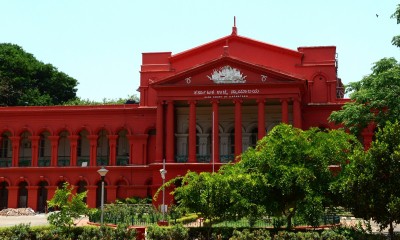
Bengaluru, With the Hijab row snowballing into a major controversy, the Karnataka High Court on Tuesday said the international community is observing us and it is not a good development.
The hearing in the matter will resume after lunch.
A bench headed by Justice Krishna S. Dixit said: "For me, Constitution is Bhagvad Gita. We have to act according to the Constitution. I have come to this position after taking oath on the Constitution. The emotions on the issue should be set aside. Wearing a hijab should not become an emotional issue."
It also observed that the government has to answer many questions on the issue.
"I am getting messages from innumerable numbers. The whole WhatsApp chat is filled with this discussion. The institutions can only work as per the constitution. The government can give orders, but people can question them," the bench noted.
"The government can't come to decisions on surmises," it said.
The bench stated that since the government is not agreeing to the petitioner's request of allowing students to wear hijab for two months, it will take up the case on the basis of merit. "There are protests and students are on roads, I am observing all developments in this regard," the judge noted.
"The government can't give a ruling against the Quran. Wearing a dress of the choice is a fundamental right. Wearing a hijab is a fundamental right, however, the government can restrict fundamental rights. There is no clear order on uniforms from the government. Wearing a hijab is a matter of privacy. The government order in this regard violates the boundaries of privacy," the bench observed.
The bench also asked the petitioner which page of Quran says that hijab is mandatory. The judge also asked for a copy of the Quran from the court's library. It also asked the petitioner to read out from the holy book to understand where it has been stated so.
The bench also asked if all traditions are fundamental practices and what is their jurisdiction.
The bench also asked whether they will have to be practiced at all places. It questioned the government at one point that why can't they allow hijab for two months and what is the problem?
Meanwhile, the counsel for the petitioner submitted that the government can only interfere in the matters which are not fundamental, according to religion. The government cannot interfere with things which are fundamental.
The petitioner submitted that, "The government should show large-heartedness in the matter. The matter can't be decided on the premises of secularism. The government should permit the wearing of hijab of the colour of the uniforms. The permission has to be given until examinations are over. Then, they can take a decision on the matter."


.jpeg)

